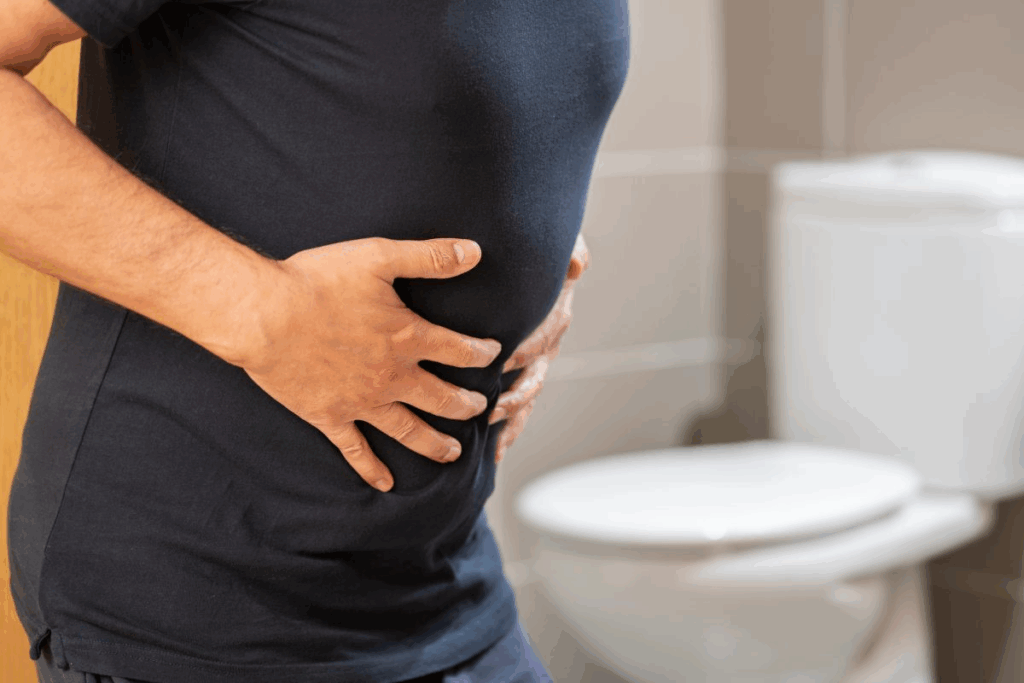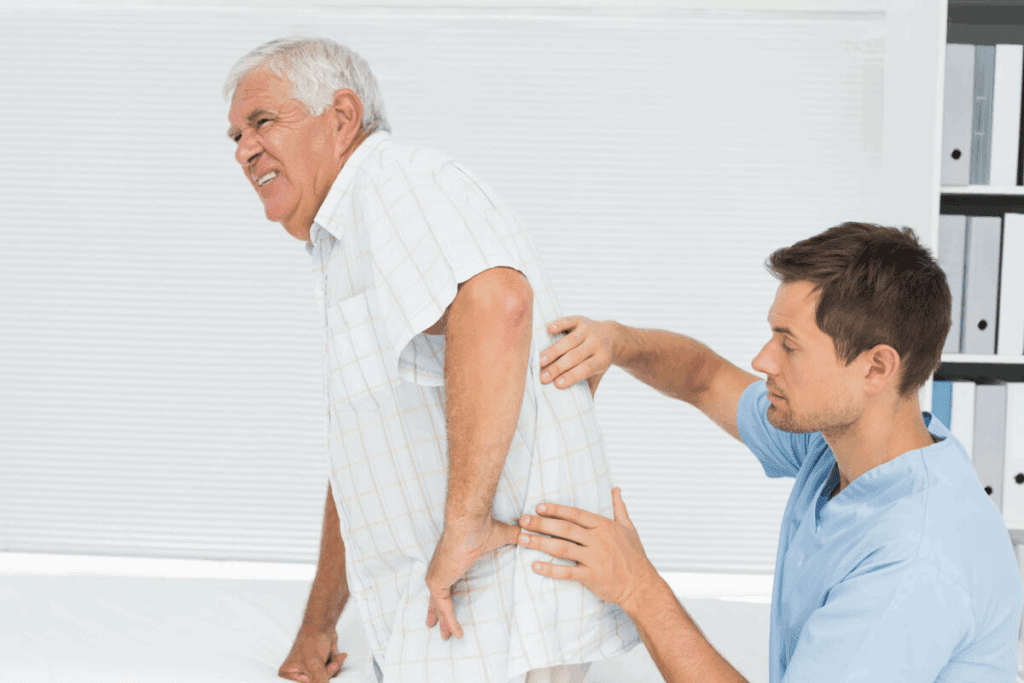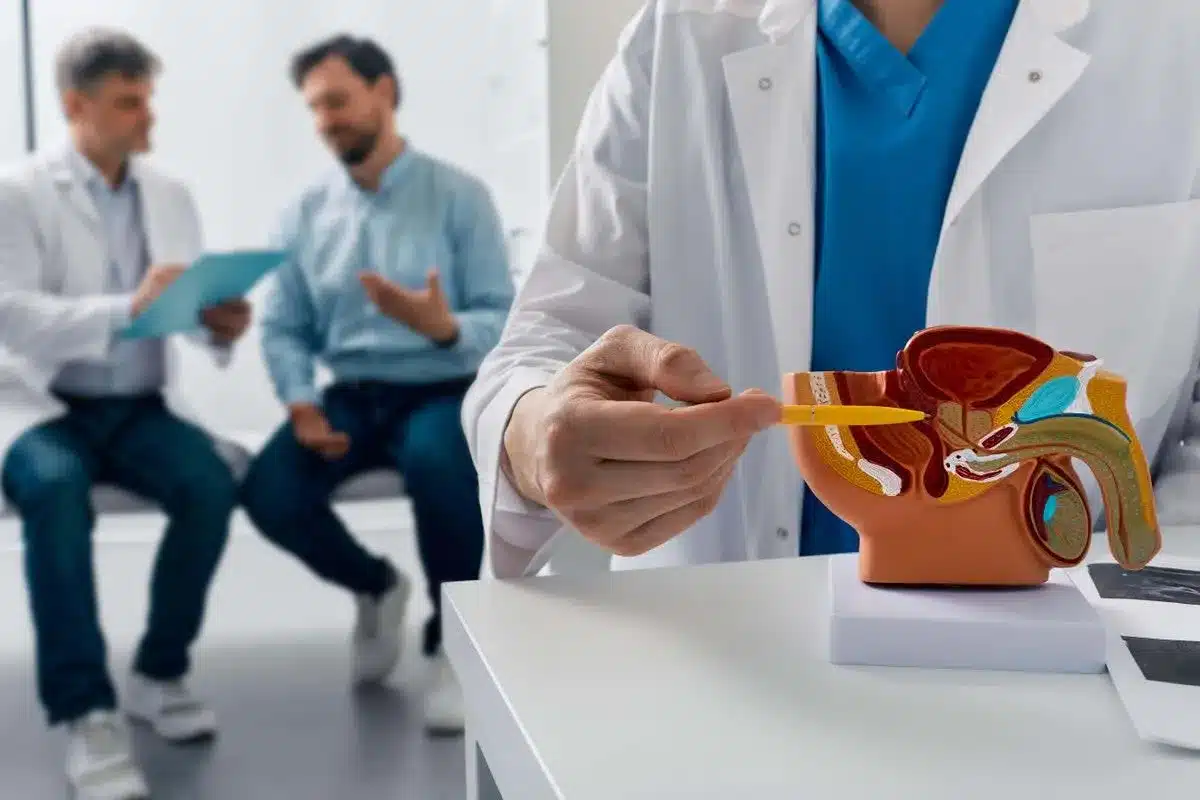
It’s important to understand how kidney stones and stomach problems are linked.will a kidney stone cause diarrheaCan Kidney Stones Cause Diarrhea and Nausea? Diarrhea isn’t a direct sign of kidney stones. But, research shows they are connected in complex ways.
At Liv Hospital, we focus on helping patients understand these connections. We offer detailed tests and treatments. We look into how kidney stones might affect your stomach, even if it’s not direct.
Key Takeaways
- Kidney stones can cause a lot of pain, which might affect your stomach.
- The link between kidney stones and stomach issues is complex.
- It’s key for patients with symptoms like diarrhea and nausea to understand this connection.
- Getting a full check-up and treatment is important for these related problems.
- Liv Hospital offers expert care to help with these complex health issues.
Understanding Kidney Stones: Prevalence and Basic Facts

Kidney stones are hard deposits made of minerals and salts that form inside the kidneys. They can cause severe pain and lead to complications if not managed well.
What Are Kidney Stones?
Kidney stones are solid masses that develop when there’s an imbalance in the urine. This imbalance can lead to the formation of various types of stones. These include:
- Calcium stones: The most common type, often associated with excess calcium in the urine.
- Uric acid stones: Typically occur in people who lose too much fluid because of chronic diarrhea or malabsorption.
- Struvite stones: Usually associated with urinary tract infections.
- Cystine stones: Form in people with a hereditary disorder that causes the kidneys to leak cystine into the urine.
Statistics and Prevalence in the United States and Globally
Kidney stones are common worldwide. About 12 percent of the global population experiences them at some point. In the United States, about 600,000 people are diagnosed with kidney stones each year. These numbers show how important it is to understand kidney stones and their impact on health.
Several factors can lead to kidney stones. These include dehydration, dietary habits, family history, and certain medical conditions. Knowing these risk factors is key to preventing and managing kidney stones.
Common Symptoms Associated with Kidney Stones

Kidney stones can cause a range of symptoms that affect more than just the urinary tract. They can impact overall health in unexpected ways.
Primary Symptoms of Kidney Stone Episodes
The main symptom of a kidney stone is intense, sharp pain. This pain is usually felt in the side, lower back, or abdomen. It can also spread to the groin area.
This pain is often described as one of the most severe pains a person can feel. It’s usually accompanied by other urinary symptoms. These include frequent urination, painful urination, and hematuria (blood in the urine).
The pain from a kidney stone can change as the stone moves. Sometimes, it leads to periods of relief followed by severe pain.
Less Recognized Signs and Symptoms
Kidney stones can also cause less recognized signs. Gastrointestinal symptoms like nausea and vomiting are common, mainly if the pain is severe. While diarrhea is not a typical symptom, it can happen in some cases.
This might be due to an infection or a significant blockage caused by the stone. The connection between the urinary and gastrointestinal systems can lead to these symptoms.
Some people may also experience systemic symptoms like fever and chills if an infection is present. Knowing these symptoms is key to diagnosing and treating kidney stones.
How Kidney Stones Cause Nausea and Vomiting
Kidney stones can cause nausea and vomiting due to severe pain. This pain moves through the nervous system. It can make you feel sick and want to throw up.
Pain-Triggered Nervous System Response
The pain from kidney stones can affect your stomach. It can make you feel queasy and want to vomit. This is because your body tries to protect you from the pain.
The nervous system controls digestion. When it’s activated by pain, digestion can change. This can lead to nausea and vomiting.
Hormonal Factors in Nausea Development
Hormones also play a part in nausea from kidney stones. Pain can trigger stress hormones. These hormones can slow digestion and make you feel nauseous.
The stress response can disrupt digestion. This makes it easier to feel nauseous and vomit. Knowing this can help manage symptoms.
Severity and Duration of Digestive Symptoms
The severity of nausea and vomiting varies. It depends on the stone’s size and how it blocks the kidney. Larger stones can cause worse symptoms.
In some cases, symptoms are so bad they need medical help. If you have persistent or severe nausea and vomiting, see a doctor. They can help manage your symptoms and address any complications.
Kidney Stones and Diarrhea: Examining the Connection
Kidney stones are often linked to severe pain. But, their connection to diarrhea is also interesting. Diarrhea isn’t usually seen as a direct symptom of kidney stones. Yet, there are cases where they are related.
Is Diarrhea a Direct Symptom of Kidney Stones?
Diarrhea isn’t a main symptom of kidney stones. The usual symptoms include severe pain, nausea, and vomiting. But, research shows that in some cases, like in children or with infections, diarrhea can happen.
Indirect Mechanisms Linking the Two Conditions
There are ways kidney stones and diarrhea can be connected indirectly. For example:
- Chronic diarrhea can cause dehydration. This makes urine more concentrated, raising the risk of kidney stones.
- Some gut conditions that cause diarrhea might also affect how minerals are absorbed. This could influence kidney stone formation.
Understanding these connections is key to managing and preventing both conditions.
Research Findings on the Association
Studies have looked into the link between kidney stones and diarrhea. They found that people with kidney stones might have more gut problems. This suggests a possible connection between the two.
“The association between kidney stones and gastrointestinal diseases is complex and likely bidirectional, with each condition potentially influencing the other.”
More research is needed to grasp the full connection. It will help doctors treat patients with both kidney stones and diarrhea better.
Pain Pathways: How Kidney Stone Pain Affects Digestive Function
Kidney stone pain can affect our digestive health. When a stone forms, it causes severe pain as it moves. This pain can also affect the autonomic nervous system, which controls digestion.
The Role of the Autonomic Nervous System
The autonomic nervous system controls our digestion. Kidney stone pain can change how our bowels move and what they secrete. This can cause symptoms like nausea, vomiting, or changes in bowel habits.
The system’s response to pain is complex. It involves neural pathways that can slow down or speed up bowel movements. For example, certain neurotransmitters can be released due to kidney stone pain.
Referred Pain and Its Impact on Bowel Motility
Referred pain is when pain is felt in a different place than where it starts. Kidney stone pain is often felt in the lower back or abdomen. These areas are close to our digestive organs.
This pain can change how our bowels move. It might make the muscles in our abdomen tense up, slowing down bowel movements. Or, it could make bowel movements faster, leading to diarrhea.
To understand how kidney stone pain affects digestion, let’s look at some key points:
| Factor | Effect on Digestive Function | Possible Symptoms |
| Autonomic Nervous System Activation | Changes in bowel motility and secretion | Nausea, vomiting, altered bowel habits |
| Referred Pain | Changes in bowel motility | Constipation, diarrhea |
| Pain-Induced Stress Response | Increased stress hormones | Loss of appetite, digestive discomfort |
Knowing these mechanisms helps doctors treat patients better. They can address both kidney stone pain and digestive symptoms more effectively.
Rare Complications: When Kidney Stones Directly Cause Bowel Issues
Kidney stones usually affect the urinary tract. But sometimes, they can also impact the bowels. This happens when a stone is very large or in a spot that presses on the intestines.
Bowel Obstruction from Large Kidney Stones
Big kidney stones can block the intestine. This is a serious problem that needs quick medical help.
Key factors contributing to bowel obstruction:
- Size of the kidney stone
- Location of the kidney stone
- Presence of any intestinal abnormalities
Inflammation and Its Effects on Intestinal Function
Inflammation from a kidney stone can harm the intestines. It can cause diarrhea, stomach pain, and nausea.
The table below shows how inflammation can affect the intestines:
| Inflammatory Effect | Intestinal Impact |
| Increased bowel motility | Diarrhea or loose stools |
| Intestinal wall irritation | Abdominal pain or cramping |
| Mucosal inflammation | Nausea or vomiting |
Case Studies and Clinical Observations
Many case studies have shown how kidney stones can harm the bowels. For example, a study in the Journal of Clinical Gastroenterology found that big stones can block the bowel. This often needs surgery.
Clinical observations have shown that quick treatment of kidney stones can prevent long-term bowel problems.
Understanding these rare issues helps doctors manage kidney stone patients better. This can reduce the risk of bowel problems.
How Chronic Diarrhea Contributes to Kidney Stone Formation
Chronic diarrhea can lead to an increased risk of kidney stones. This is due to dehydration and imbalances in electrolytes. When we have chronic diarrhea, we lose a lot of fluids and essential electrolytes. This creates an environment where kidney stones can form more easily.
Dehydration and Urine Concentration
Dehydration is a big risk factor for kidney stones. When we’re dehydrated, our urine gets more concentrated. This means more calcium, oxalate, and uric acid can crystallize and form stones. Concentrated urine makes it easier for these substances to turn into stones.
Chronic diarrhea makes dehydration worse. It causes us to lose too much fluid. This increases the chance of getting kidney stones.
Electrolyte Imbalances and Their Role in Stone Development
Electrolyte imbalances are key in forming kidney stones. Chronic diarrhea can cause us to lose important electrolytes like potassium, sodium, and citrate. Citrate is important because it helps prevent calcium stones by binding to calcium in the urine. Without enough citrate, the risk of calcium stones goes up.
Other electrolyte imbalances can also affect the pH of our urine. This can make it easier for stones to form.
- Loss of potassium and other electrolytes can alter urinary chemistry.
- Reduced citrate levels increase the risk of calcium stone formation.
- Electrolyte imbalances can affect the pH of the urine, making it more conducive to stone formation.
Risk Assessment for Patients with Chronic Digestive Issues
People with chronic digestive issues, like chronic diarrhea, are at higher risk for kidney stones. We need to check for risk factors like how bad the diarrhea is, dehydration, and electrolyte imbalances. Early identification helps us take steps to prevent kidney stones. This includes drinking enough water and making dietary changes.
- Assess the severity and duration of chronic diarrhea.
- Monitor for signs of dehydration and electrolyte imbalances.
- Implement preventive measures, including adequate hydration and dietary adjustments.
The Bidirectional Relationship Between Digestive Disorders and Kidney Stones
Studies have found a strong link between digestive problems and kidney stones. This connection affects how doctors diagnose and treat patients with both issues.
Inflammatory Bowel Disease and Kidney Stone Risk
Inflammatory bowel disease (IBD) raises the risk of kidney stones. This is mainly because of malabsorption of nutrients. This malabsorption can cause urine to have substances that form stones more easily.
IBD patients often face dehydration and changes in their gut. These factors also increase the risk of kidney stones.
The 30% Connection: Kidney Stones and New IBS Cases
About 30% of new irritable bowel syndrome (IBS) cases start within six months after a kidney stone. This shows that kidney stones might trigger or worsen gut symptoms. This could lead to IBS in some people.
The reasons for this link are not clear. But it might be because of changes in bowel habits and sensitivity after a kidney stone.
Malabsorption Syndromes and Their Impact on Kidney Health
Malabsorption syndromes, like celiac disease or pancreatic insufficiency, harm kidney health. Malabsorption of calcium and other minerals increases the risk of kidney stones.
Malabsorption also causes dehydration and imbalances in electrolytes. Both are risk factors for kidney stones.
It’s key to understand the link between digestive issues and kidney stones for better care. Doctors need to know how gut problems can affect kidneys and vice versa.
Diagnosis and Treatment Approaches for Patients with Both Conditions
Dealing with patients who have both kidney stones and stomach issues is complex. At our institution, we tackle this challenge head-on. We aim to offer top-notch healthcare and support to patients from around the world.
Diagnostic Challenges and Considerations
Figuring out what’s wrong with patients who have both kidney stones and stomach problems is tricky. Symptoms can be similar, making it hard to find the root cause of their pain.
We use many tools to figure out what’s going on. This includes imaging and lab tests. Getting the diagnosis right is key to creating a good treatment plan.
Medications That May Affect Both Conditions
Some medicines can make kidney stones worse and also upset the stomach. For example, some drugs might raise the risk of getting kidney stones. Others might make stomach problems worse.
- Medications that alter urine pH or composition
- Drugs that affect bowel motility or secretion
- Medications with possible stomach side effects
We look closely at what medicines a patient is taking. This helps us plan their treatment better.
Integrated Treatment Strategies
When treating patients with both kidney stones and stomach issues, we take a holistic approach. We aim to tackle both problems at the same time.
| Treatment Approach | Kidney Stone Management | Gastrointestinal Symptom Management |
| Dietary Modifications | Hydration and dietary changes to prevent stone formation | Dietary adjustments to manage gastrointestinal symptoms |
| Medications | Medications to prevent stone formation or manage pain | Medications to control gastrointestinal symptoms |
When to Seek Medical Attention
If a patient is in a lot of pain, vomiting, or shows signs of infection, they need to see a doctor fast. Quick action is important to avoid serious problems and manage both conditions well.
By using a detailed and all-in-one approach to diagnosis and treatment, we aim to give the best care possible. This is for patients with both kidney stones and stomach issues.
Conclusion: Managing the Complex Interplay Between Kidney Health and Digestive Function
We understand the link between kidney health and digestive function is key. It’s important for caring for patients with these issues. The connection between kidney stones and stomach problems is complex and goes both ways.
To handle kidney stones and stomach issues, we need a team effort. We must look at how kidney stones impact digestion. This way, doctors can give better care and treatments to patients.
Fixing kidney health and digestion means tackling the root causes. This includes drinking enough water, managing pain, and treating other health problems. These steps help with both kidney stones and stomach issues.
By taking a whole-person approach, we can help people with kidney stones and stomach problems. This improves their life quality greatly.
FAQ
Can kidney stones cause diarrhea?
Diarrhea isn’t a common symptom of kidney stones. But, sometimes the pain from kidney stones can affect the digestive system. This might lead to diarrhea.
Do kidney stones cause nausea and vomiting?
Yes, kidney stone pain can affect the nervous system. This can cause nausea and vomiting as the body reacts to the pain.
Can chronic diarrhea contribute to kidney stone formation?
Yes, chronic diarrhea can lead to dehydration. Dehydration increases the risk of kidney stones by concentrating urine and stone-forming substances.
Is there a bidirectional relationship between digestive disorders and kidney stones?
Yes, some digestive issues, like inflammatory bowel disease, can raise the risk of kidney stones. On the other hand, having a kidney stone might increase the risk of irritable bowel syndrome (IBS).
How do kidney stones affect digestive function?
Kidney stone pain can affect the autonomic nervous system. This system controls bowel movements, leading to symptoms like nausea, vomiting, or changes in bowel habits.
Can a kidney stone cause bowel obstruction?
Large kidney stones can rarely cause bowel obstruction. Inflammation or infection from the stone can affect the intestines, leading to diarrhea.
How are patients with both kidney stones and gastrointestinal symptoms managed?
Managing patients with both conditions requires a deep understanding of their interplay. It involves addressing diagnostic challenges, medication effects, and finding integrated treatment plans.
Does dehydration play a role in kidney stone formation?
Yes, dehydration is a major risk factor for kidney stones. It makes urine more concentrated, increasing the risk of stone formation.
Can kidney stones cause diarrhea indirectly?
Yes, while diarrhea isn’t a direct symptom, there are indirect links. For example, chronic diarrhea can lead to dehydration, which increases the risk of kidney stones.
What is the connection between inflammatory bowel disease and kidney stone risk?
Gastrointestinal conditions like inflammatory bowel disease can increase the risk of kidney stones. This is due to malabsorption of nutrients.
References
- Reimer, R. P., Engels, R., & Huizinga, W. (2020). Size and volume of kidney stones in computed tomography: Impact on clinical management. European Journal of Radiology, 129, Article 109098. https://www.sciencedirect.com/science/article/abs/pii/S0720048X20304563





